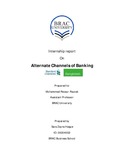| dc.contributor.advisor | Razzak, Mohammad Rezaur | |
| dc.contributor.author | Haque, Sara Zayna | |
| dc.date.accessioned | 2014-01-27T09:40:32Z | |
| dc.date.available | 2014-01-27T09:40:32Z | |
| dc.date.copyright | 2013 | |
| dc.date.issued | 2013-08-31 | |
| dc.identifier.other | ID 09204002 | |
| dc.identifier.uri | http://hdl.handle.net/10361/2867 | |
| dc.description | This internship report is submitted in a partial fulfillment of the requirements for the degree of Bachelor of Business Administration,2013. | |
| dc.description | Cataloged from PDF version of Internship report. | |
| dc.description | Includes bibliographical references (page 43). | |
| dc.description.abstract | In the constantly changing world of today, where past is being replaced by dynamic present and the dynamic present is being replaced by more challenging future, the old ways of doing things is no longer valid. Change is permanent and a reality. Science and technology is changing the way financial institutions perform their transactions. Gone are those days of formal banking. Today’s banks are shaking by these technological changes and embracing newer ways of branch less banking or alternate channels of banking. Alternate channel of banking commonly known as, electronic banking (E- banking) is the waves of the future. It provides enormous benefits to consumers in terms of case and cost of transactions, either through internet, telephone or other electronic delivery channels. For many consumers, electronic banking means 24-hours access to cash through an Automated Teller Machine (ATM) or Direct Deposit of pay cheques into checking or savings accounts. But electronic banking now involves many different types of transactions. E-banking is a form of banking where funds are transferred through an exchange of electronic signals between financial institution, rather than exchange of cash, cheque or other negotiable instruments. With the expansion of global Information and Communication Technology (ICT) infrastructure and the internet, e-banking is set to play a pivotal role in the national economy, proper software, infrastructure and skilled manpower are important for the implementation of e-banking in the country. In Bangladesh, several banks are offering alternate channels of banking. Having been considered Standard Chartered Bank is one of few banks which offer a comprehensive set of benefits and services to keep customers satisfied with their banking experience. The bank is not only the leading foreign bank of the country but also one of the few banks that have revolutionized the banking service industry through adoption of modern technology and process with a view to enhancing customer satisfaction. Digital banking Services is one of such technological advancements which are comprised of ATMs, CDMs, SMS banking and Online banking etc. | en_US |
| dc.description.statementofresponsibility | Sara Zayna Haque | |
| dc.format.extent | 75 pages | |
| dc.language.iso | en | en_US |
| dc.publisher | BRAC University | en_US |
| dc.rights | BRAC University Internship reports are protected by copyright. They may be viewed from this source for any purpose, but reproduction or distribution in any format is prohibited without written permission. | |
| dc.subject | Business administration | |
| dc.subject | E-banking | |
| dc.title | Alternate channels of banking of Standard Chartered Bank | en_US |
| dc.type | Internship report | en_US |
| dc.contributor.department | BRAC Business School, BRAC University | |
| dc.description.degree | B. Business Administration | |

